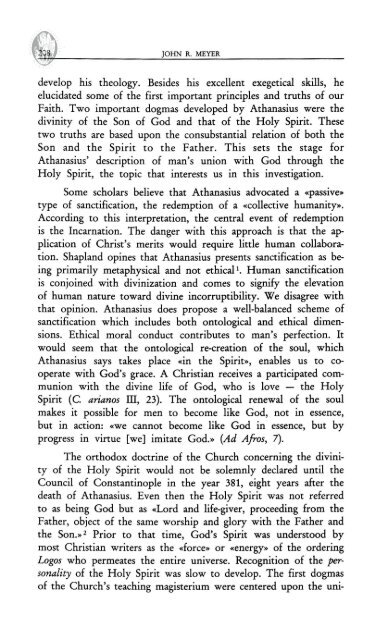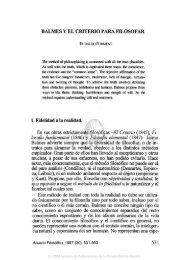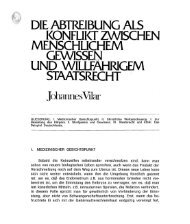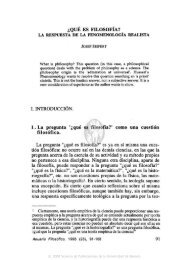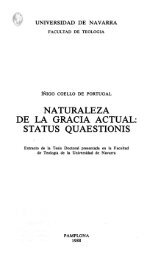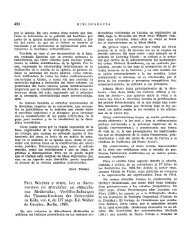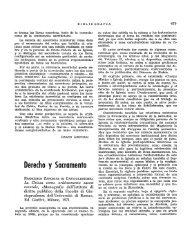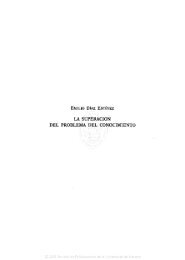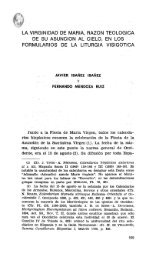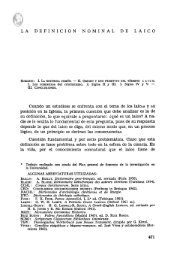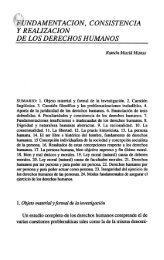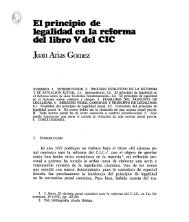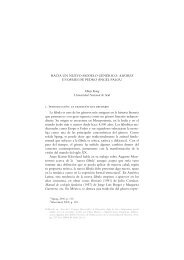the soteriology of saint athanasius of alexandria the conformation of ...
the soteriology of saint athanasius of alexandria the conformation of ...
the soteriology of saint athanasius of alexandria the conformation of ...
Create successful ePaper yourself
Turn your PDF publications into a flip-book with our unique Google optimized e-Paper software.
208 JOHN R. MEYER<br />
develop his <strong>the</strong>ology. Besides his excellent exegetical skills, he<br />
elucidated some <strong>of</strong> <strong>the</strong> first important principles and truths <strong>of</strong> our<br />
Faith. Two important dogmas developed by Athanasius were <strong>the</strong><br />
divinity <strong>of</strong> <strong>the</strong> Son <strong>of</strong> God and that <strong>of</strong> <strong>the</strong> Holy Spirit. These<br />
two truths are based upon <strong>the</strong> consubstantial relation <strong>of</strong> both <strong>the</strong><br />
Son and <strong>the</strong> Spirit to <strong>the</strong> Fa<strong>the</strong>r. This sets <strong>the</strong> stage for<br />
Athanasius' description <strong>of</strong> man's union with God through <strong>the</strong><br />
Holy Spirit, <strong>the</strong> topic that interests us in this investigation.<br />
Some scholars believe that Athanasius advocated a «passive»<br />
type <strong>of</strong> sanctification, <strong>the</strong> redemption <strong>of</strong> a «collective humanity».<br />
According to this interpretation, <strong>the</strong> central event <strong>of</strong> redemption<br />
is <strong>the</strong> Incarnation. The danger with this approach is that <strong>the</strong> application<br />
<strong>of</strong> Christ's merits would require little human collaboration.<br />
Shapland opines that Athanasius presents sanctification as being<br />
primarily metaphysical and not ethical 1 . Human sanctification<br />
is conjoined with divinization and comes to signify <strong>the</strong> elevation<br />
<strong>of</strong> human nature toward divine incorruptibility. We disagree with<br />
that opinion. Athanasius does propose a well-balanced scheme <strong>of</strong><br />
sanctification which includes both ontological and ethical dimensions.<br />
Ethical moral conduct contributes to man's perfection. It<br />
would seem that <strong>the</strong> ontological re-creation <strong>of</strong> <strong>the</strong> soul, which<br />
Athanasius says takes place «in <strong>the</strong> Spirit», enables us to cooperate<br />
with God's grace. A Christian receives a participated communion<br />
with <strong>the</strong> divine life <strong>of</strong> God, who is love — <strong>the</strong> Holy<br />
Spirit (C. arianos III, 23). The ontological renewal <strong>of</strong> <strong>the</strong> soul<br />
makes it possible for men to become like God, not in essence,<br />
but in action: «we cannot become like God in essence, but by<br />
progress in virtue [we] imitate God.» (Ad Afros, 7).<br />
The orthodox doctrine <strong>of</strong> <strong>the</strong> Church concerning <strong>the</strong> divinity<br />
<strong>of</strong> <strong>the</strong> Holy Spirit would not be solemnly declared until <strong>the</strong><br />
Council <strong>of</strong> Constantinople in <strong>the</strong> year 381, eight years after <strong>the</strong><br />
death <strong>of</strong> Athanasius. Even <strong>the</strong>n <strong>the</strong> Holy Spirit was not referred<br />
to as being God but as «Lord and life-giver, proceeding from <strong>the</strong><br />
Fa<strong>the</strong>r, object <strong>of</strong> <strong>the</strong> same worship and glory with <strong>the</strong> Fa<strong>the</strong>r and<br />
<strong>the</strong> Son.» 2 Prior to that time, God's Spirit was understood by<br />
most Christian writers as <strong>the</strong> «force» or «energy» <strong>of</strong> <strong>the</strong> ordering<br />
Logos who permeates <strong>the</strong> entire universe. Recognition <strong>of</strong> <strong>the</strong> personality<br />
<strong>of</strong> <strong>the</strong> Holy Spirit was slow to develop. The first dogmas<br />
<strong>of</strong> <strong>the</strong> Church's teaching magisterium were centered upon <strong>the</strong> uni-


